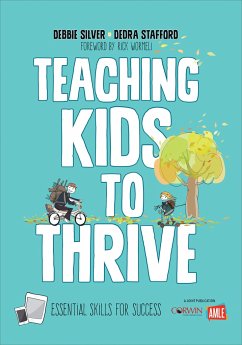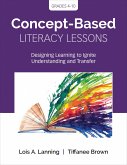- Broschiertes Buch
- Merkliste
- Auf die Merkliste
- Bewerten Bewerten
- Teilen
- Produkt teilen
- Produkterinnerung
- Produkterinnerung
For years research has pointed to an overwhelmingly positive correlation between social and emotional learning (SEL) and successful student performance. However, the recent push for the Common Core Curriculum, higher standards, Race to the Top, STEM, and other cognitively-based initiatives have crowded out the time, money, and resources for the implementation of SEL either school wide or even in individual classrooms. Common cries from teachers include, "I just don't have a single minute to devote to anything other than what is going to be on the test," or "If my administrator comes in here…mehr
Andere Kunden interessierten sich auch für
![Tools for Teaching Conceptual Understanding, Elementary Tools for Teaching Conceptual Understanding, Elementary]() Julie SternTools for Teaching Conceptual Understanding, Elementary46,99 €
Julie SternTools for Teaching Conceptual Understanding, Elementary46,99 €![Tools for Teaching Conceptual Understanding, Secondary Tools for Teaching Conceptual Understanding, Secondary]() Julie SternTools for Teaching Conceptual Understanding, Secondary44,99 €
Julie SternTools for Teaching Conceptual Understanding, Secondary44,99 €![How to Educate a Citizen How to Educate a Citizen]() Jr. E. D. HirschHow to Educate a Citizen23,99 €
Jr. E. D. HirschHow to Educate a Citizen23,99 €![How to Educate a Citizen How to Educate a Citizen]() Jr. E. D. HirschHow to Educate a Citizen21,99 €
Jr. E. D. HirschHow to Educate a Citizen21,99 €![Higher Expectations Higher Expectations]() Derek BokHigher Expectations22,99 €
Derek BokHigher Expectations22,99 €![Thrive Thrive]() Grant LichtmanThrive44,99 €
Grant LichtmanThrive44,99 €![Concept-Based Literacy Lessons Concept-Based Literacy Lessons]() Lois A. LanningConcept-Based Literacy Lessons43,99 €
Lois A. LanningConcept-Based Literacy Lessons43,99 €-
-
-
For years research has pointed to an overwhelmingly positive correlation between social and emotional learning (SEL) and successful student performance. However, the recent push for the Common Core Curriculum, higher standards, Race to the Top, STEM, and other cognitively-based initiatives have crowded out the time, money, and resources for the implementation of SEL either school wide or even in individual classrooms. Common cries from teachers include, "I just don't have a single minute to devote to anything other than what is going to be on the test," or "If my administrator comes in here and sees us doing that 'touchy-feely' stuff, I will be in real trouble!" However, new research shows strong evidence that America's teachers embrace the ideas of SEL for promoting academic success, student engagement, cooperation, and other positive attributes as well as for acting to deter truancy, drug use, bullying, and violence. Teachers from all over the country have been asking us exactly how they should go about integrating SEL into their classrooms. This book is our response to that request.
Hinweis: Dieser Artikel kann nur an eine deutsche Lieferadresse ausgeliefert werden.
Hinweis: Dieser Artikel kann nur an eine deutsche Lieferadresse ausgeliefert werden.
Produktdetails
- Produktdetails
- Verlag: SAGE Publications Inc
- Seitenzahl: 288
- Erscheinungstermin: 9. Mai 2017
- Englisch
- Abmessung: 251mm x 175mm x 20mm
- Gewicht: 600g
- ISBN-13: 9781506326931
- ISBN-10: 1506326935
- Artikelnr.: 47444180
- Herstellerkennzeichnung
- Produktsicherheitsverantwortliche/r
- Europaallee 1
- 36244 Bad Hersfeld
- gpsr@libri.de
- Verlag: SAGE Publications Inc
- Seitenzahl: 288
- Erscheinungstermin: 9. Mai 2017
- Englisch
- Abmessung: 251mm x 175mm x 20mm
- Gewicht: 600g
- ISBN-13: 9781506326931
- ISBN-10: 1506326935
- Artikelnr.: 47444180
- Herstellerkennzeichnung
- Produktsicherheitsverantwortliche/r
- Europaallee 1
- 36244 Bad Hersfeld
- gpsr@libri.de
Dr. Debbie Silver is a humorist, consultant, and retired educator with over thirty years of experience as a classroom teacher, staff development facilitator, and university professor. As a classroom teacher, Debbie won numerous awards, including the 1990 Louisiana Teacher of the Year award. She speaks worldwide on issues involving education and is a passionate advocate for students and teachers. Debbie wrote the best-selling books, Drumming to the Beat of Different Marchers and Fall Down 7 Times, Get Up 8. She co-wrote the best-selling Teaching Kids to Thrive. In 1990, Debbie Pace and Lawrence Silver merged their families of 3 boys (Debbie) and 2 boys (Lawrence) as they married and eventually both earned their doctorate degrees (to form a "pair-a-docs"). They currently reside in Melissa, TX. One of the nation's most popular keynote speakers and professional development presenters, Debbie has given presentations around the world (including 49 states [Hey, Delaware, let's talk!], Canada, Mexico, Europe, the Middle East, Australia, Africa, and Asia), helping audiences to interact with students on a more meaningful level. While inspiring educators to enjoy the job they once loved, she reminds them of how important they are in the lives of children, their families, and the world. Through her writing and her speaking she makes essential points while sharing poignant stories and lots of laughs.
Foreword
About the Authors
Acknowledgments
INTRODUCTION
Why Teach Social and Emotional Learning (SEL) in the Classroom?
What Are the Thrive Skills?
Taking This Book to the Next Level (Thrive Website)
Thriving Together
CHAPTER 1. MINDFULNESS IN THE CLASSROOM: SLOWING DOWN TO SPEED UP SUCCESS
Why Don't They Just Pay Attention?
Mindfulness: What It Is and What It Is Not
Using Mindfulness in the Classroom
Beginning a Mindfulness Practice
Research on Mindfulness in the Classroom
Implementation in the Classroom
What Supporting Mindfulness Looks Like in the Classroom
Frequently Asked Questions
Discussion Questions and Exercises
Thrive Skills in Action
CHAPTER 2. HELPING STUDENTS WITH THEIR COMMAND AND CONTROL FUNCTIONS
Executive Function: What Is It?
The Six Skills of Executive Functioning
EF Skill 1: Self-Regulation and Self-Control
EF Skill 2: Working Memory
EF Skill 3: Task Initiation, Organization, and Time Management
EF Skill 4: Flexibility
EF Skill 5: Emotional Regulation
EF Skill 6: Focus
What Supporting Executive Function Looks Like in the Classroom
Frequently Asked Questions
Discussion Questions and Exercises
Thrive Skills in Action
CHAPTER 3. CREATING STUDENT AGENCY THROUGH SELF-EFFICACY AND GROWTH MINDSET
Self-Efficacy: What Is It?
Self-Efficacy: What Is It Not? (Learned Helplessness)
Aim for the Zone of Proximal Development (ZPD)
Students' Beliefs About Success (Attribution Theory)
Growth vs. Fixed Mindsets
How Do We Help Students Develop Growth Mindsets?
What Supporting Self-Efficacy and Growth Mindset Looks Like in the
Classroom
Frequently Asked Questions
Discussion Questions and Exercises
Thrive Skills in Action
CHAPTER 4. PERSEVERANCE: PUSHING THROUGH DESPITE THE SETBACKS
Quit Now or Finish? What Makes the Difference?
Perseverance: What It Is and What It Is Not
What Educators Need to Know About Perseverance
What Does Perseverance Look Like in the Classroom?
What Supporting Perseverance Looks Like in the Classroom
Frequently Asked Questions
Discussion Questions and Exercises
Thrive Skills in Action
CHAPTER 5. BOUNCING BACK: TEACHING KIDS ABOUT RESILIENCE
Resilience: What Is It?
Acknowledge the Struggle
Normalize the Struggle
The Classroom as the Tribe
Resiliency in Boys
Developing Resiliency Through Competency
Building Hope
What Supporting Resilience Looks Like in the Classroom
Frequently Asked Questions
Discussion Questions and Exercises
Thrive Skills in Action
CHAPTER 6. BUILDING A CULTURE OF RESPONSIBILITY IN THE CLASSROOM
Give Kids a Chance to Act Responsibly
Teaching Responsibility in an Entitled Society
Using Accountability to Promote Responsibility
Building a Culture of Responsibility
Teachers as Models of Responsibility
How Do We Reinforce Responsibility?
What Supporting Responsibility Looks Like in the Classroom
Frequently Asked Questions
Discussion Questions and Exercises
Thrive Skills in Action
CHAPTER 7. CULTIVATING HONESTY AND INTEGRITY IN STUDENT CHOICES
How Do We Teach Personal Integrity?
How Do We Teach Academic Integrity?
What Do We Do When Children Cheat?
The Restorative Justice Approach
The Courage to Take a Stand
What Supporting Honesty and Integrity Looks Like in the Classroom
Frequently Asked Questions
Discussion Questions and Exercises
Thrive Skills in Action
CHAPTER 8. TAPPING INTO EMPATHY
Empathy: What Is It?
Does Everyone Have Empathy?
What Does Empathy Look Like in Action?
Why Is It Important to Teach About Empathy?
Modeling Empathy in the Classroom
Service Learning Projects
Integrating Empathy Into the Curriculum
The Power of Empathy
What Supporting Empathy Looks Like in the Classroom
Frequently Asked Questions
Discussion Questions and Exercises
Thrive Skills in Action
CHAPTER 9. IT'S ALL ABOUT GRATITUDE
"Pay It Forward" Is Still Thriving
Gratitude: What Is It?
What Research Tells Us About Gratitude
Why We Should Teach Gratitude in the Classroom
How Do We Teach Gratitude in the Classroom?
What Supporting Gratitude Looks Like in the Classroom
Frequently Asked Questions
Discussion Questions and Exercises
Thrive Skills in Action
Final Words
References
Index
About the Authors
Acknowledgments
INTRODUCTION
Why Teach Social and Emotional Learning (SEL) in the Classroom?
What Are the Thrive Skills?
Taking This Book to the Next Level (Thrive Website)
Thriving Together
CHAPTER 1. MINDFULNESS IN THE CLASSROOM: SLOWING DOWN TO SPEED UP SUCCESS
Why Don't They Just Pay Attention?
Mindfulness: What It Is and What It Is Not
Using Mindfulness in the Classroom
Beginning a Mindfulness Practice
Research on Mindfulness in the Classroom
Implementation in the Classroom
What Supporting Mindfulness Looks Like in the Classroom
Frequently Asked Questions
Discussion Questions and Exercises
Thrive Skills in Action
CHAPTER 2. HELPING STUDENTS WITH THEIR COMMAND AND CONTROL FUNCTIONS
Executive Function: What Is It?
The Six Skills of Executive Functioning
EF Skill 1: Self-Regulation and Self-Control
EF Skill 2: Working Memory
EF Skill 3: Task Initiation, Organization, and Time Management
EF Skill 4: Flexibility
EF Skill 5: Emotional Regulation
EF Skill 6: Focus
What Supporting Executive Function Looks Like in the Classroom
Frequently Asked Questions
Discussion Questions and Exercises
Thrive Skills in Action
CHAPTER 3. CREATING STUDENT AGENCY THROUGH SELF-EFFICACY AND GROWTH MINDSET
Self-Efficacy: What Is It?
Self-Efficacy: What Is It Not? (Learned Helplessness)
Aim for the Zone of Proximal Development (ZPD)
Students' Beliefs About Success (Attribution Theory)
Growth vs. Fixed Mindsets
How Do We Help Students Develop Growth Mindsets?
What Supporting Self-Efficacy and Growth Mindset Looks Like in the
Classroom
Frequently Asked Questions
Discussion Questions and Exercises
Thrive Skills in Action
CHAPTER 4. PERSEVERANCE: PUSHING THROUGH DESPITE THE SETBACKS
Quit Now or Finish? What Makes the Difference?
Perseverance: What It Is and What It Is Not
What Educators Need to Know About Perseverance
What Does Perseverance Look Like in the Classroom?
What Supporting Perseverance Looks Like in the Classroom
Frequently Asked Questions
Discussion Questions and Exercises
Thrive Skills in Action
CHAPTER 5. BOUNCING BACK: TEACHING KIDS ABOUT RESILIENCE
Resilience: What Is It?
Acknowledge the Struggle
Normalize the Struggle
The Classroom as the Tribe
Resiliency in Boys
Developing Resiliency Through Competency
Building Hope
What Supporting Resilience Looks Like in the Classroom
Frequently Asked Questions
Discussion Questions and Exercises
Thrive Skills in Action
CHAPTER 6. BUILDING A CULTURE OF RESPONSIBILITY IN THE CLASSROOM
Give Kids a Chance to Act Responsibly
Teaching Responsibility in an Entitled Society
Using Accountability to Promote Responsibility
Building a Culture of Responsibility
Teachers as Models of Responsibility
How Do We Reinforce Responsibility?
What Supporting Responsibility Looks Like in the Classroom
Frequently Asked Questions
Discussion Questions and Exercises
Thrive Skills in Action
CHAPTER 7. CULTIVATING HONESTY AND INTEGRITY IN STUDENT CHOICES
How Do We Teach Personal Integrity?
How Do We Teach Academic Integrity?
What Do We Do When Children Cheat?
The Restorative Justice Approach
The Courage to Take a Stand
What Supporting Honesty and Integrity Looks Like in the Classroom
Frequently Asked Questions
Discussion Questions and Exercises
Thrive Skills in Action
CHAPTER 8. TAPPING INTO EMPATHY
Empathy: What Is It?
Does Everyone Have Empathy?
What Does Empathy Look Like in Action?
Why Is It Important to Teach About Empathy?
Modeling Empathy in the Classroom
Service Learning Projects
Integrating Empathy Into the Curriculum
The Power of Empathy
What Supporting Empathy Looks Like in the Classroom
Frequently Asked Questions
Discussion Questions and Exercises
Thrive Skills in Action
CHAPTER 9. IT'S ALL ABOUT GRATITUDE
"Pay It Forward" Is Still Thriving
Gratitude: What Is It?
What Research Tells Us About Gratitude
Why We Should Teach Gratitude in the Classroom
How Do We Teach Gratitude in the Classroom?
What Supporting Gratitude Looks Like in the Classroom
Frequently Asked Questions
Discussion Questions and Exercises
Thrive Skills in Action
Final Words
References
Index
Foreword
About the Authors
Acknowledgments
INTRODUCTION
Why Teach Social and Emotional Learning (SEL) in the Classroom?
What Are the Thrive Skills?
Taking This Book to the Next Level (Thrive Website)
Thriving Together
CHAPTER 1. MINDFULNESS IN THE CLASSROOM: SLOWING DOWN TO SPEED UP SUCCESS
Why Don't They Just Pay Attention?
Mindfulness: What It Is and What It Is Not
Using Mindfulness in the Classroom
Beginning a Mindfulness Practice
Research on Mindfulness in the Classroom
Implementation in the Classroom
What Supporting Mindfulness Looks Like in the Classroom
Frequently Asked Questions
Discussion Questions and Exercises
Thrive Skills in Action
CHAPTER 2. HELPING STUDENTS WITH THEIR COMMAND AND CONTROL FUNCTIONS
Executive Function: What Is It?
The Six Skills of Executive Functioning
EF Skill 1: Self-Regulation and Self-Control
EF Skill 2: Working Memory
EF Skill 3: Task Initiation, Organization, and Time Management
EF Skill 4: Flexibility
EF Skill 5: Emotional Regulation
EF Skill 6: Focus
What Supporting Executive Function Looks Like in the Classroom
Frequently Asked Questions
Discussion Questions and Exercises
Thrive Skills in Action
CHAPTER 3. CREATING STUDENT AGENCY THROUGH SELF-EFFICACY AND GROWTH MINDSET
Self-Efficacy: What Is It?
Self-Efficacy: What Is It Not? (Learned Helplessness)
Aim for the Zone of Proximal Development (ZPD)
Students' Beliefs About Success (Attribution Theory)
Growth vs. Fixed Mindsets
How Do We Help Students Develop Growth Mindsets?
What Supporting Self-Efficacy and Growth Mindset Looks Like in the
Classroom
Frequently Asked Questions
Discussion Questions and Exercises
Thrive Skills in Action
CHAPTER 4. PERSEVERANCE: PUSHING THROUGH DESPITE THE SETBACKS
Quit Now or Finish? What Makes the Difference?
Perseverance: What It Is and What It Is Not
What Educators Need to Know About Perseverance
What Does Perseverance Look Like in the Classroom?
What Supporting Perseverance Looks Like in the Classroom
Frequently Asked Questions
Discussion Questions and Exercises
Thrive Skills in Action
CHAPTER 5. BOUNCING BACK: TEACHING KIDS ABOUT RESILIENCE
Resilience: What Is It?
Acknowledge the Struggle
Normalize the Struggle
The Classroom as the Tribe
Resiliency in Boys
Developing Resiliency Through Competency
Building Hope
What Supporting Resilience Looks Like in the Classroom
Frequently Asked Questions
Discussion Questions and Exercises
Thrive Skills in Action
CHAPTER 6. BUILDING A CULTURE OF RESPONSIBILITY IN THE CLASSROOM
Give Kids a Chance to Act Responsibly
Teaching Responsibility in an Entitled Society
Using Accountability to Promote Responsibility
Building a Culture of Responsibility
Teachers as Models of Responsibility
How Do We Reinforce Responsibility?
What Supporting Responsibility Looks Like in the Classroom
Frequently Asked Questions
Discussion Questions and Exercises
Thrive Skills in Action
CHAPTER 7. CULTIVATING HONESTY AND INTEGRITY IN STUDENT CHOICES
How Do We Teach Personal Integrity?
How Do We Teach Academic Integrity?
What Do We Do When Children Cheat?
The Restorative Justice Approach
The Courage to Take a Stand
What Supporting Honesty and Integrity Looks Like in the Classroom
Frequently Asked Questions
Discussion Questions and Exercises
Thrive Skills in Action
CHAPTER 8. TAPPING INTO EMPATHY
Empathy: What Is It?
Does Everyone Have Empathy?
What Does Empathy Look Like in Action?
Why Is It Important to Teach About Empathy?
Modeling Empathy in the Classroom
Service Learning Projects
Integrating Empathy Into the Curriculum
The Power of Empathy
What Supporting Empathy Looks Like in the Classroom
Frequently Asked Questions
Discussion Questions and Exercises
Thrive Skills in Action
CHAPTER 9. IT'S ALL ABOUT GRATITUDE
"Pay It Forward" Is Still Thriving
Gratitude: What Is It?
What Research Tells Us About Gratitude
Why We Should Teach Gratitude in the Classroom
How Do We Teach Gratitude in the Classroom?
What Supporting Gratitude Looks Like in the Classroom
Frequently Asked Questions
Discussion Questions and Exercises
Thrive Skills in Action
Final Words
References
Index
About the Authors
Acknowledgments
INTRODUCTION
Why Teach Social and Emotional Learning (SEL) in the Classroom?
What Are the Thrive Skills?
Taking This Book to the Next Level (Thrive Website)
Thriving Together
CHAPTER 1. MINDFULNESS IN THE CLASSROOM: SLOWING DOWN TO SPEED UP SUCCESS
Why Don't They Just Pay Attention?
Mindfulness: What It Is and What It Is Not
Using Mindfulness in the Classroom
Beginning a Mindfulness Practice
Research on Mindfulness in the Classroom
Implementation in the Classroom
What Supporting Mindfulness Looks Like in the Classroom
Frequently Asked Questions
Discussion Questions and Exercises
Thrive Skills in Action
CHAPTER 2. HELPING STUDENTS WITH THEIR COMMAND AND CONTROL FUNCTIONS
Executive Function: What Is It?
The Six Skills of Executive Functioning
EF Skill 1: Self-Regulation and Self-Control
EF Skill 2: Working Memory
EF Skill 3: Task Initiation, Organization, and Time Management
EF Skill 4: Flexibility
EF Skill 5: Emotional Regulation
EF Skill 6: Focus
What Supporting Executive Function Looks Like in the Classroom
Frequently Asked Questions
Discussion Questions and Exercises
Thrive Skills in Action
CHAPTER 3. CREATING STUDENT AGENCY THROUGH SELF-EFFICACY AND GROWTH MINDSET
Self-Efficacy: What Is It?
Self-Efficacy: What Is It Not? (Learned Helplessness)
Aim for the Zone of Proximal Development (ZPD)
Students' Beliefs About Success (Attribution Theory)
Growth vs. Fixed Mindsets
How Do We Help Students Develop Growth Mindsets?
What Supporting Self-Efficacy and Growth Mindset Looks Like in the
Classroom
Frequently Asked Questions
Discussion Questions and Exercises
Thrive Skills in Action
CHAPTER 4. PERSEVERANCE: PUSHING THROUGH DESPITE THE SETBACKS
Quit Now or Finish? What Makes the Difference?
Perseverance: What It Is and What It Is Not
What Educators Need to Know About Perseverance
What Does Perseverance Look Like in the Classroom?
What Supporting Perseverance Looks Like in the Classroom
Frequently Asked Questions
Discussion Questions and Exercises
Thrive Skills in Action
CHAPTER 5. BOUNCING BACK: TEACHING KIDS ABOUT RESILIENCE
Resilience: What Is It?
Acknowledge the Struggle
Normalize the Struggle
The Classroom as the Tribe
Resiliency in Boys
Developing Resiliency Through Competency
Building Hope
What Supporting Resilience Looks Like in the Classroom
Frequently Asked Questions
Discussion Questions and Exercises
Thrive Skills in Action
CHAPTER 6. BUILDING A CULTURE OF RESPONSIBILITY IN THE CLASSROOM
Give Kids a Chance to Act Responsibly
Teaching Responsibility in an Entitled Society
Using Accountability to Promote Responsibility
Building a Culture of Responsibility
Teachers as Models of Responsibility
How Do We Reinforce Responsibility?
What Supporting Responsibility Looks Like in the Classroom
Frequently Asked Questions
Discussion Questions and Exercises
Thrive Skills in Action
CHAPTER 7. CULTIVATING HONESTY AND INTEGRITY IN STUDENT CHOICES
How Do We Teach Personal Integrity?
How Do We Teach Academic Integrity?
What Do We Do When Children Cheat?
The Restorative Justice Approach
The Courage to Take a Stand
What Supporting Honesty and Integrity Looks Like in the Classroom
Frequently Asked Questions
Discussion Questions and Exercises
Thrive Skills in Action
CHAPTER 8. TAPPING INTO EMPATHY
Empathy: What Is It?
Does Everyone Have Empathy?
What Does Empathy Look Like in Action?
Why Is It Important to Teach About Empathy?
Modeling Empathy in the Classroom
Service Learning Projects
Integrating Empathy Into the Curriculum
The Power of Empathy
What Supporting Empathy Looks Like in the Classroom
Frequently Asked Questions
Discussion Questions and Exercises
Thrive Skills in Action
CHAPTER 9. IT'S ALL ABOUT GRATITUDE
"Pay It Forward" Is Still Thriving
Gratitude: What Is It?
What Research Tells Us About Gratitude
Why We Should Teach Gratitude in the Classroom
How Do We Teach Gratitude in the Classroom?
What Supporting Gratitude Looks Like in the Classroom
Frequently Asked Questions
Discussion Questions and Exercises
Thrive Skills in Action
Final Words
References
Index








